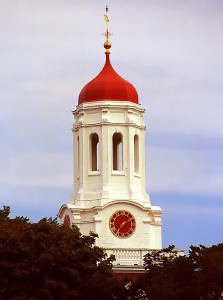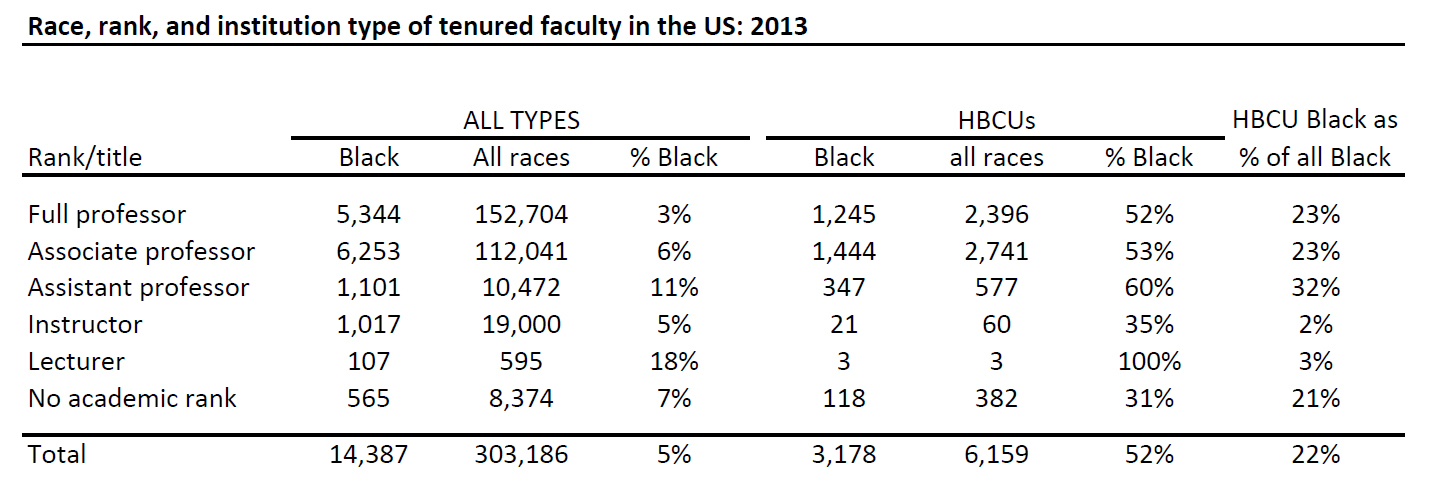No, 96% of Black tenured faculty are not at HBCUs

What percentage of Black tenured professors work at Historically Black Colleges and Universities (HCBUs)? In an article in the January 29 Washington Post, education journalist Valerie Strauss states that it’s 96%. Not surprisingly, this statistic quickly fed into the social media outrage machine, and has been widely distributed.
Strauss linked to a November blog post that she published in the Post, by Leslie Fenwick and Patrick Swygert, who wrote:
Of course, the majority of the nation’s tenured black faculty are at historically black colleges/universities (HBCUs). Most earned their doctoral or other terminal degrees at traditionally white institutions, but despite these credentials are not vigorously recruited or advanced into the ranks of tenured faculty in large numbers at TWIs. Remarkably, 96 percent of black tenured faculty are at HBCUs (even though HBCUs comprise only 3 percent of the nation’s 3000 colleges and universities). If HBCUs disappeared, so would most of the nation’s black academics.
Unfortunately, the statistic doesn’t pass the sniff test. HBCUs are an important feature on the landscape of American higher education, but they aren’t a large feature on that landscape. According to the publicly available Integrated Postsecondary Education Data System (IPEDs), the main federal repository for data on higher education in the US, there are approximately 100 HBCUs, out of about 7,500 post-secondary institutions. Granted, a surprising number of these 7,500 are hair and cosmetology schools. But, even if you limit the search to degree-granting institutions, more than 4,800 colleges and universities are listed in IPEDs.
HBCUs thus make up only about 2% of the total number of colleges and universities. And, although a handful of HBCUs employ more than 1,000 instructional staff, most are much smaller. If HBCU’s really employed 96% of all Black tenured academics, the number of Black tenured academics at the remaining 4,700 colleges and universities would need to be implausibly small. Sniff test, failed.
But if it’s not true 96% of the Black tenured faculty work at HBCUs, what is the correct percentage? In 2013, the most recent year of mandatory reporting to IPEDs, there were about 14,400 Black tenured academics in the US, not counting those at institutions with missing data. This includes full professors, associate professors, assistant professors, lecturers, instructors, and faculty with “no academic rank.”
Incidentally, 14,400 Black tenured academics constitute only 4.7% of the total number of tenured academics in the US.
In 2013, HBCUs (excluding 6 with missing data) reported 6,159 tenured academics, of all ranks. Of these, 3,178 or 52% are Black.

The correct answer to the question: 22%. The Post articles, and whatever the original source may have been, are off by a factor of more than 4.
Would America’s colleges, students, and economy benefit from more diversity (of all kinds) among the professoriate? Yes, absolutely. But grossly exaggerated claims about the level of racial segregation in American higher education do a disservice to those of us who believe in both the value of diversity and the value of data.
(Oh, and it turns out that women own more than 1% of world’s property, too.)
Kim Weeden is in the sociology department and director of the Center for the Study of Inequality at Cornell University. She was also a co-director of Cornell’s NSF-funded ADVANCE center to increase the recruitment, retention, and professional success of women and scholars of color in STEM.

Comments 6
Maliq Matthew
March 12, 2016Kim, you're using the term "tenured" in a strange way. I would think we'd only be discussing professors who actually hold tenure at their institutions, not people who hold any type of position anywhere. This could be tricky to figure out because of places that tenure without promoting or promote without tenure, but most assistant profs wouldn't qualify, and certainly not instructors and lecturers. Any idea what "no academic rank" entails, for purposes of clarity?
Mindelyn Anderson
August 28, 2016Maliq raises an excellent point. It would be great to see Kim or another sociologist working with the IPEDS dataset crunch the numbers to report the "real" percentage. If not 4% (gloom and doom) or 22% (deceivingly optimistic), then what is the percentage of tenured Black faculty? Let's disaggregate by native-born and foreign-born as well to reveal the nuances of race and stratification in these United States. Perhaps Pamela Bennett or Amy Lutz can help in this endeavor?
hkm
October 6, 2018If you were interested in playing card game then from here you will play spider solitaire online with all unlocked level in just some easiest way without any pay and app installation.
William Chambers
May 16, 2019Being a student is much more difficult than to be a schoolboy, we do a lot of tasks and our professors are quite strict with us. We are asked a lot of different writing projects and works, and therefore I want to advise an excellent platform https://studymoose.com/how-many-pages-is-3000-words where you can find numerous article review that will definitely make your life easier.
Joanne White
September 25, 2019Writing an essay is hard? If you firmly believe that you cannot cope with this task well – do not fall into despair! Just contact our professional writing team with the request “Help me to write my personal narrative essay, please” .
EssaysWriters.com
October 27, 2020I'd say that the more you read, the better you are at writing. But if you have no time, you can just use https://essayswriters.com/ when you need to complete a writing assignment. Welcome to the premier essays online source of custom written papers, professional proofreading, and editing services.